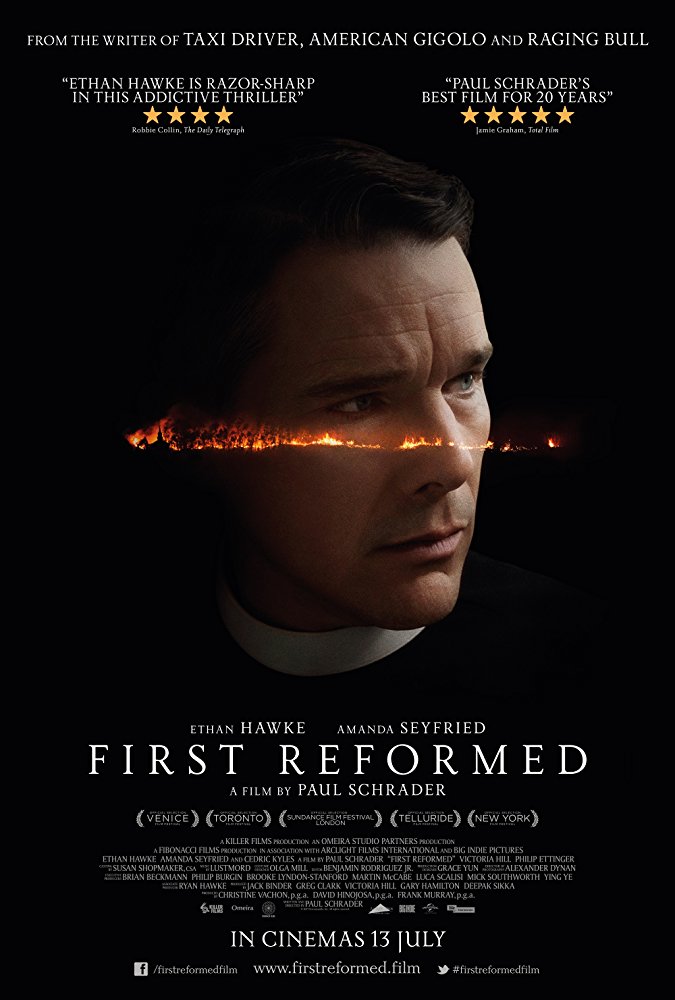Movie Review

Every once in a while, a movie comes along that reminds you of why you love movies so much. Sometimes you forget because there is so much crap out there in commercial fare. First Reformed is just such a movie. Written and directed by Paul Schrader, it is a movie not to be missed.
First a little about Paul Schrader. He is now 71. When he was 24 and a film student he wrote a book, which proved to be very influential in the coming years, entitled, Transcendental Style in Film. He fell under the sway of esteemed film critic Pauline Kael and became a film critic himself. Two years later he was writing and directing films. He is best known for Taxi Driver (1976) and Raging Bull (1980). He has 24 screen writing credits and 23 director credits. Even though he is known for a particular style he has never employed the transcendental style in any of his movies. Until now.
First Reformed is shot in transcendental style which Schrader first defined as a 24-year-old film student. What is transcendental style anyway? A style of filmmaking employed by Carl Theodor Dreyer, Robert Bresson, and Yasujiro Ozu. Transcendental style is an attempt to withhold certain cinematic elements the viewer might expect to see. Sometimes a static camera is employed, sometimes a kinetic camera. Slower cuts and fewer cuts. The camera might linger on a doorway a little while longer after a character leaves a scene, A static camera lingers on an empty room as characters enter then exit. The camera holds a little longer than expected. These devices are intended to make the viewer “lean’ in to the movie and to engage the viewer. It is a style that is intended to bring the viewer closer to the “other”, to the mystery.
It is called transcendental because there is a spiritual dimension that is sought after. This is achieved through style not content. Schrader later revealed in interviews that he realized what he was witnessing in some of the films he studied was an outgrowth of post WWII neorealism.
Schrader breaks from that style twice in First Reformed. The first time is a tender scene in which Toller and Mary lie on top of each other while they try to match their breathing patterns. Schrader asks himself, what would Tarkovsky do? Levitate! So, he has the couple mysteriously begin to levitate. The other time is the film’s final scene, which is I won’t describe here.
Schrader freely admits who his influencers were: “There is a little Tarkovsky in there. The credits are from Rossellini. The barbed wire is from Flannery O’Connor (I knew it!). That’s the secret of creativity. You have to steal around.” Also, it is pretty evident that Winter Light (1963), directed by Ingmar Bergman, was the blueprint for this film.
Ethan Hawke, in probably the best performance of his career, plays Reverend Ernest Toller, a character in spiritual crisis. He is pastor at the First Reformed Church which is a spin off of a mega-church called Abundant Life Ministries run by Reverend Joel Jeffers, played very effectively by Cedrick the Entertainer (Cedric Kyles) in an unusual casting choice.
Toller’s church is small and has few parishioners. The source of his pain is that as a military chaplain he encouraged his son to enlist in the army who was later killed in action in Iraq. His marriage did not survive his son’s death. His ministry at First Reformed is sort of a penance.
One morning after service a young woman approaches Toller and asks him to counsel her husband. Mary (Amanda Seyfried) is with child. Her husband Michael is going through a spiritual crisis of his own. He is an environmental activist and is very depressed at the thought of bringing a child into the world that is undergoing the throes of devestating climate change. He wants Mary to have an abortion. During their counseling session Michael asks the question, “Will God Forgive us for destroying his creation?”
Toller is a drinking man and keeps a journal in his spare study. He continues to drink and slips further into despair. After his dealings with Michael he slowly starts to become radicalized. He moves closer to Mary but cannot overcome his despair. The movie progresses to a startling conclusion which leaves the viewer a little bit perplexed. It is an ambiguous ending and we don’t know for sure if what we are witnessing is reality. In any case this is a powerful film that one is not likely soon to forget.
To be honest, this doesn’t sound like “my kinda Movie” but your review has so piqued my interest such that I will undoubtedly see it! Thanks
LikeLiked by 1 person
It’s not for everyone. Definitely not commercial fare. But I hope you will see it. Let me know what you think. Cheers!
LikeLike
I was curious about the interpretation of a transcendental style in cinematography, so that made for interesting reading. You feeling this was perhaps the best performance from Hawke is also quite a motivating reason to check this out as I’ve found prior performances of his to be incredibly engaging, so I’m curious as to how he comes across in this role. Definitely on my to-watch list! Great write-up 🙂
LikeLiked by 2 people
Thanks! Please let me know what you think
LikeLiked by 1 person
Reblogged this on badmanreviews.
LikeLike
Cool!
LikeLike
I can’t wait to watch this one. Your review got me more excited.
LikeLiked by 1 person
Let me know what you think!
LikeLike